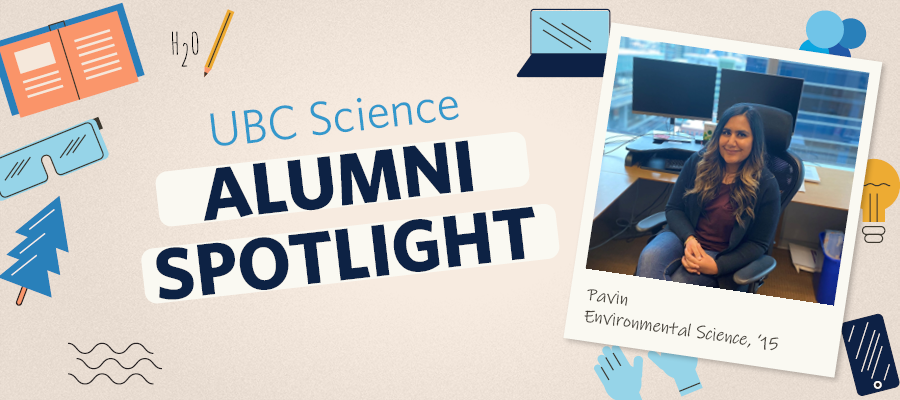Science Alumni Profile: Pavin - Environmental Science, Minor International Relations, ‘15
November 13, 2020

November 13, 2020

UBC Science alumni have gone on to build meaningful and fulfilling careers in sectors around the world. Our conversations with alumni have told us that your journey through Science and beyond isn’t a linear path but a complex navigation of right and left turns, and even some dead-ends, that will eventually lead you to where you're meant to be.
Our Science Alumni Spotlight Series will show you the breadth of career paths that UBC Science alumni have pursued, and offer a fresh perspective on new opportunities to discover.

There are cross overs in my career where some of my environmental science knowledge pops up, given that many of my firm's clients are in the energy and oil and gas sector, but on a whole my major is not directly related to what I do. The skills that were developed during my undergraduate degree, however, such as analytical reasoning, critical thinking, and research are directly involved in my day-to-day. The skills I learned pursuing my major are what translates into my current work, not necessarily the exact knowledge or classes.
I pursued a minor in international relations which introduced me more to law and politics, but also allowed me to take a lot more courses outside of science, and from there I realized more of what I wanted to pursue as a career.
I was deeply involved in UBC Science life when I was a student. Among other clubs and activities, I was a founding member of the Women in Science Club, I was a member of SCI Team, and president of the UBC Meal Exchange. All of these extracurricular activities enhanced my time management and practice management skills; they also improved my advocacy skills and public speaking skills. These activities also required me to work in a team for a common goal, which is what law is all about. In the field of law, you need to be efficient with your time and deliver excellent work quality for your clients. Involvement in extracurricular activities while you’re studying helps you practice these skills.
Don't be afraid if your interests and passions do not align with your peers in science and you find yourself not wanting to pursue a career in the sciences. You do not have to be a doctor or dentist just because you have a science degree or came into your science degree thinking that was the career path you had to take. The skills you learn including studying for exams, researching for papers, and presenting group projects, are important and you may not even realize it but these skills are helping you build your future career in whatever it might be.
In order to pursue my career as a lawyer, I went through an additional three-year JD program after my undergraduate degree followed by a year of articling at a firm. Law school in itself was a steep learning curve. I found that law school thinking was different than science thinking. When there is a math problem in front of you, there is usually one right answer. Law doesn't necessarily work like this; there may be a range of possibilities or reasonable solutions to a problem. Learning to think in this mindset took some time. Notwithstanding the learning curve, I truly believe that the strong background in research, writing, and critical thinking I developed during my science undergraduate degree helped me be successful in law school and now at my firm.
My current occupation does not align with what I planned on pursuing when I entered UBC. I imagined that I would be somewhere in the STEM field once I graduated. I knew by around my third year I wanted to pursue a career in law and become a lawyer.
Although you may be in a field completely unrelated to what you studied, there are moments when your undergraduate knowledge trickles into your career, and it is strange but awesome. An example for me was knowing all about carbon emissions when looking at new legislation and cases.
I plan to continue in private practice. I work at a global full-service law firm and the plan is to continue down this way, progressing in the firm.
A science undergraduate degree from UBC is a great step towards whatever career that may follow. Follow your passions and hopefully you will be in a career and role that fits you.




Responses have been edited for clarity and brevity.
We honour xwməθkwəy̓ əm (Musqueam) on whose ancestral, unceded territory UBC Vancouver is situated. UBC Science is committed to building meaningful relationships with Indigenous peoples so we can advance Reconciliation and ensure traditional ways of knowing enrich our teaching and research.
Learn more: Musqueam First Nation